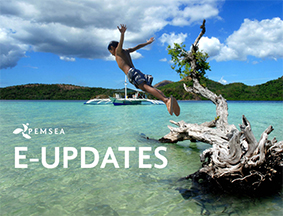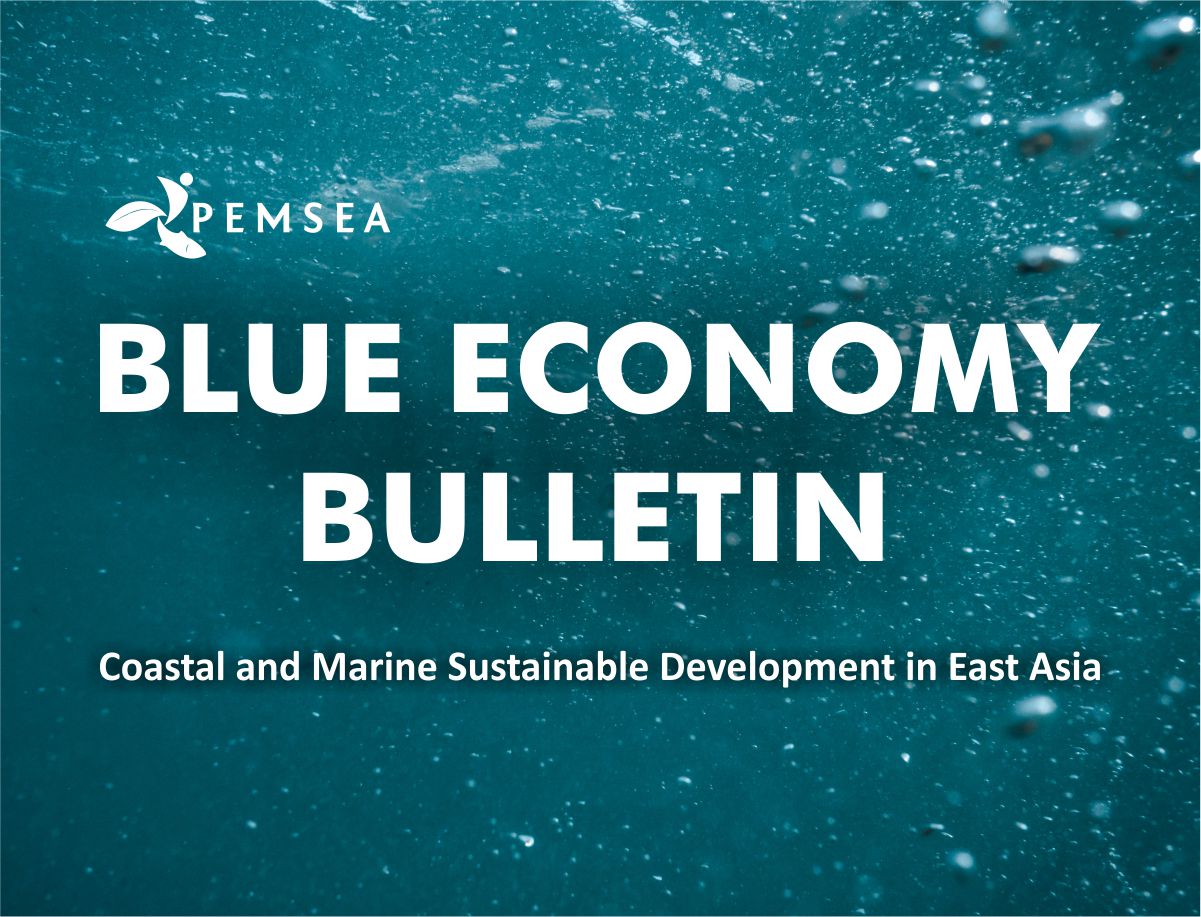
Breadcrumb
-
Research And Local Government Partnerships: Our September E-Update
Welcome to the September 2022 PEMSEA e-update. This month we welcome the continued partnership with SKLMP, who have been redesignated as a regional Center of Excellent (RCOE). We look forward to the PEMSEA Network of Local Government (PNLG) annual forum, and wish a fond farewell to PEMSEA friend Andrew Hudson. In between newsletters, follow us on Facebook and Twitter (@PEMSEA) for the latest updates.
-
Blue Economy Bulletin: Integrated Coastal Management (ICM) In East Asia
Welcome to the August 2022 PEMSEA Blue Economy Bulletin. We would like you to join PEMSEA at the upcoming UN Climate Conference meeting (COP27), where PEMSEA will join the Virtual Ocean Pavilion. This month we share interviews on PEMSEA's development and on the growth in Integrated Coastal Management (ICM), as well as a site visit to ICM sites in the Philippines. The 2022 Youth Video and Small Grants Competitions are ongoing.
In wider news, no agreement was reached for a high seas treaty, while new research has put the percentage of marine life at risk from climate change at 90% and the economic impacts of climate change are expected to be in the trillions. However, Indonesia has announced plans to expand its protected seas, and new research has come out on the link between marine management and ecosystem services.
Follow the latest updates on blue economy and coastal sustainable development in East Asia on Facebook and Twitter (@PEMSEA). We welcome your feedback, and please let us know if there are other blue economy topics you would like to see in future newsletters and programs.
-
PEMSEA E-Update: Ocean Leaders, A Marine Litter Toolkit, A Biofouling Strategy, And More
Welcome to the July 2022 PEMSEA e-update. This month we welcome new leaders at the East Asian Seas Partnership Council. We also share the release of an LGU toolkit on marine litter, a draft regional strategy for biofouling management, and an updated briefing on the PEMSEA Network of Local Governments. In between newsletters, follow us on Facebook and Twitter (@PEMSEA) for the latest updates.
-
Blue Economy Bulletin: Climate Change Challenges, Youth Competition, And Waste Management
Welcome to the June 2022 Blue Economy Bulletin. This month, PEMSEA hosted the the Annual East Asian Seas Roundtable Dialogue entitled Ocean and Climate Dialogue: East Asian Seas' Response to the Global Climate Change Challenge. We also launched the EAS Futures Video and Small Grants Competitions, open to those under 30 in the East Asian region and shared progress made in Guimaras province on climate change adaptation and disaster risk reduction, as well as a story of a local teacher-champion on the war against plastic wastes in Cavite from the ASEANO plastic pollution project.
June also saw progress in global Ocean Management, with a WTO agreement on fisheries subsidies, followed by the UN Ocean Conference in Lisbon Portugal. A hotter than normal summer highlights the need for climate change adaptation, while a new projection on waste growth by the OECD shows the necessity of better waste management.
Follow the latest updates on blue economy and coastal sustainable development in East Asia on Facebook and Twitter (@PEMSEA). We welcome your feedback, and please let us know if there are other blue economy topics you would like to see in future newsletters and programs.
-
SDG 14, Upcoming Ocean And Climate Dialogue, Call For Papers, And More
Welcome to the May PEMSEA e-bulletin. Ahead of the 'Our Ocean Conference' in Lisbon, Portugal, on 27 June - 1 July, we share a message on the progress of Sustainable Development Goal 14, Life Below Water, an SDG that is integral to the health of our shared seas and the communities around them. We also invite you to an Ocean and Climate Dialogue on the region's response to Climate Change. Wrapping up, we share our annual report, a call for papers by the Hanoi University of Natural Resources and Environment, and ocean updates from country partners. In between newsletters, follow us on Facebook and Twitter (@PEMSEA) for the latest updates.
-
Blue Economy Bulletin: Port Waste, Riverine Plastic, Ocean And Climate
Welcome to the April 2022 Blue Economy Bulletin. Knowing a blue economy cannot be achieved without climate action, we would like to invite you to our upcoming Ocean and Climate Dialogue, taking place on 8 June. Our work towards different aspects of the Blue Economy continues, including research on riverine plastic pollution and working to implement a ship port waste management system.
This month also saw the announcement of the winners of our 2022 EASF Youth Photo Competition, with entries showcasing the range of ways that the ocean affects daily life. Also released was the ATSEA-2 Annual Report 2021, which looked at actions taken in the Arafura and Timor Seas region to pursue long-term sustainability.
In wider Blue Economy news, the IPCC has released a new report, a final warning for the global community regarding the need to bring down carbon emissions. Deep-sea mining negotiations continue, ship tracking is improving, and an international coalition against ghost gear is growing.
Follow the latest updates on blue economy and coastal sustainable development in East Asia on Facebook and Twitter (@PEMSEA). We welcome your feedback, and please let us know if there are other blue economy topics you would like to see in future newsletters and programs.
-
E-Update March 2022
Welcome to PEMSEA's March 2022 e-update. This month we share some blue economy initiatives by the Asian Infrastructure Investment Bank, alongside a video they shared at the East Asian Seas Congress 2021. We have also released the full Post-Congress Report. Celebrating work in the region, we share a story on Integrated Coastal Management (ICM) in Chonburi, Thailand, as well spotlight some of the amazing women working towards a sustainable future around the seas of East Asia. We also feature ocean news stories from around the world. We applaud countries for agreeing to negotiate an end to plastic pollution and hope that a consensus on the high seas treaty will not be too far behind. In between newsletters, follow us on Facebook and Twitter (@PEMSEA) for the latest updates.
-
Blue Economy Bulletin: Junkshop Operations And Our Youth Photo Competition
Welcome to the first PEMSEA Blue Economy Bulletin of 2022. With COVID-19 having caused an increase in plastic pollution, PEMSEA shares the work of junkshops in Cavite, which play a crucial role in managing waste. We also thank recent participants of our youth internship program, and remind everyone of a final chance to submit to the EAS Futures Youth Photo Competition.
Plastic pollution is also a target of international discussions, and recent research includes the significant of paint microplastics and microplastic accumulation in river sediment. Greater investment in a blue economy has been called for, which may include improvements in seaweed farming, or improving eco-tourism.
Follow the latest updates on blue economy and coastal sustainable development in East Asia on Facebook and Twitter (@PEMSEA). We welcome your feedback, and please let us know if there are other blue economy topics you would like to see in future newsletters and programs.
-
January 2022 E-Update
Happy New Year, and welcome to the first 2022 PEMSEA e-update. As we start our year, we share a story of the waste pickers of Cavite Province in the Philippines, gathered as part of our ongoing ASEANO project on marine plastic pollution. We have also released proceedings from an oil spill training workshop, along with the main conference proceedings of the East Asian Seas Congress 2021, and the 7th East Asian Seas Ministerial Forum.
Please also keep in mind the ongoing PEMSEA Youth Photo Competition, as well as our Regional State of Oceans and Coast report released at the end of last year. In between newsletters, follow us on Facebook and Twitter (@PEMSEA) for the latest updates.

